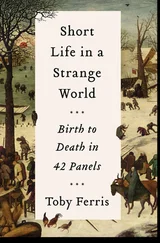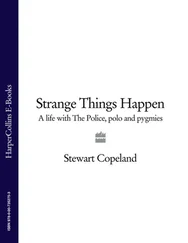Douglas Hofstadter - I Am a Strange Loop
Здесь есть возможность читать онлайн «Douglas Hofstadter - I Am a Strange Loop» весь текст электронной книги совершенно бесплатно (целиком полную версию без сокращений). В некоторых случаях можно слушать аудио, скачать через торрент в формате fb2 и присутствует краткое содержание. Жанр: Прочая документальная литература, на английском языке. Описание произведения, (предисловие) а так же отзывы посетителей доступны на портале библиотеки ЛибКат.
- Название:I Am a Strange Loop
- Автор:
- Жанр:
- Год:неизвестен
- ISBN:нет данных
- Рейтинг книги:4 / 5. Голосов: 1
-
Избранное:Добавить в избранное
- Отзывы:
-
Ваша оценка:
- 80
- 1
- 2
- 3
- 4
- 5
I Am a Strange Loop: краткое содержание, описание и аннотация
Предлагаем к чтению аннотацию, описание, краткое содержание или предисловие (зависит от того, что написал сам автор книги «I Am a Strange Loop»). Если вы не нашли необходимую информацию о книге — напишите в комментариях, мы постараемся отыскать её.
I Am a Strange Loop — читать онлайн бесплатно полную книгу (весь текст) целиком
Ниже представлен текст книги, разбитый по страницам. Система сохранения места последней прочитанной страницы, позволяет с удобством читать онлайн бесплатно книгу «I Am a Strange Loop», без необходимости каждый раз заново искать на чём Вы остановились. Поставьте закладку, и сможете в любой момент перейти на страницу, на которой закончили чтение.
Интервал:
Закладка:
This activity is called, as you well know, “finding a proof ”, or stated otherwise, turning a conjecture into a theorem. The late great eccentric Hungarian mathematician Paul Erdös once made the droll remark that “a mathematician is a device for turning coffee into theorems”, and although there is surely truth in his witticism, it would be more accurate to say that mathematicians are devices for finding conjectures and turning them into theorems.
What underlies the mathematical mindset is an unshakable belief that whenever some mathematical statement X is true, then X has a proof, and vice versa. Indeed, to the mathematical mind, “having a proof ” is no more and no less than what “being true” means! Symmetrically, “being false” means “having no proof ”. One can find hints of a perfect, infinite pattern by doing numerical explorations, as we did above, but how can one know for sure that a suspected regularity will continue forever, without end? How can one know, for instance, that there are infinitely many prime numbers? How do we know there will not, at some point, be a last one — the Great Last Prime P ?
If it existed, P would be a truly important and interesting number, but if you look at a long list of consecutive primes (the list above of primes up to 100 gives the flavor), you will see that although their rhythm is a bit “bumpy”, with odd gaps here and there, the interprime gaps are always quite small compared to the size of the primes involved. Given this very clear trend, if the primes were to run out all of a sudden, it would almost feel like falling off the edge of the Earth without any warning. It would be a huge shock. Still, how do we know this won’t happen? Or do we know it? Finding, with the help of a computer, that new primes keep on showing up way out into the billions and the trillions is great, but it won’t guarantee in rock-solid fashion that they won’t just stop all of a sudden somewhere out further. We have to rely on reasoning to get us there, because although finite amounts of evidence can be strongly suggestive, they just don’t cut the mustard, because infinity is very different from any finite number.
Sailing the Ocean of Primes and Falling off the Edge
You probably have seen Euclid’s proof of the infinitude of the primes somewhere, but if not, you have missed out on one of the most crucial pillars of human knowledge that ever have been found. It would be a gap in your experience of life as sad as never having tasted chocolate or never having heard a piece of music. I can’t tolerate such crucial gaps in my readers’ knowledge, so here goes nothing!
Let’s suppose that P, the Great Last Prime in the Sky, does exist, and see what that supposition leads to. For P to exist means that there is a Finite, Closed Club of All Primes, of which P itself is the glorious, crowning, final member. Well then, let’s boldly multiply all the primes in the Closed Club together to make a delightfully huge number called Q. This number Q is thus divisible by 2 and also by 3, 5, 7, 11, and so forth. By its definition, Q is divisible by every prime in the Club, which means by every prime in the universe! And now, for a joyous last touch, as in birthday parties, let’s add one candle to grow on, to make Q + 1. So here’s a colossal number that, we are assured, is not prime, since P (which is obviously dwarfed by Q ) is the Great Last Prime, the biggest prime of all. All numbers beyond P are, by our initial supposition, composite. Therefore Q + 1, being way beyond P and hence composite, has to have some prime divisor. (Remember this, please.)
What could that unknown prime divisor be? It can’t be 2, because 2 divides Q itself, which is just one step below Q + 1, and two even numbers are never located at a distance of 1 from each other. It also can’t be 3, because 3 likewise divides Q itself, and numbers divisible by 3 are never next-door neighbors! In fact, whatever prime p that we select from the Club, we find that p can’t divide Q + 1, because p divides its lower neighbor Q (and multiples of p are never next-door neighbors — they come along only once every p numbers). And so reasoning has shown us that none of the members of the Finite, Closed Club of Primes divides Q + 1.
But above, I observed (and I asked you to remember) that Q + 1, being composite, has to have a prime divisor. Sting! We have been caught in a trap, painted ourselves into a corner. We have concocted a crazy number — a number that on the one hand must be composite ( i.e., has some smaller prime divisor) and yet on the other hand has no smaller prime divisor. This contradiction came out of our assumption that there was a Finite, Closed Club of Primes, gloriously crowned by P , and so we have no choice but to go back and erase that whole amusing, suspect vision.
There cannot be a “Great Last Prime in the Sky”; there cannot be a “Finite, Closed Club of All Primes”. These are fictions. The truth, as we have just demonstrated, is that the list of primes goes on without end. We will never, ever “fall off the Earth”, no matter how far out we go. Of that we now are assured by flawless reasoning, in a way that no finite amount of computational sailing among seas of numbers could ever have assured us.
If, perchance, coming to understand why there is no last prime (as opposed to merely knowing that it is the case) was a new experience to you, I hope you savored it as much as a piece of chocolate or of music. And just like such experiences, following this proof is a source of pleasure that one can come back to and dip into many times, finding it refreshing each new time. Moreover, this proof is a rich source of other proofs — Variations on a Theme by Euclid (though we will not explore them here).
The Mathematician’s Credo
We have just seen up close a lovely example of what I call the “Mathematician’s Credo”, which I will summarize as follows:
X is true because there is a proof of X;
X is true and so there is a proof of X.
Notice that this is a two-way street. The first half of the Credo asserts that proofs are guarantors of truth, and the second half asserts that where there is a regularity, there is a reason. Of course we ourselves may not uncover the hidden reason, but we firmly and unquestioningly believe that it exists and in principle could someday be found by someone.
To doubt either half of the Credo would be unthinkable to a mathematician. To doubt the first line would be to imagine that a proved statement could nonetheless be false, which would make a mockery of the notion of “proof ”, while to doubt the second line would be to imagine that within mathematics there could be perfect, exceptionless patterns that go on forever, yet that do so with no rhyme or reason. To mathematicians, this idea of flawless but reasonless structure makes no sense at all. In that regard, mathematicians are all cousins of Albert Einstein, who famously declared, “God does not play dice.” What Einstein meant is that nothing in nature happens without a cause, and for mathematicians, that there is always one unifying, underlying cause is an unshakable article of faith.
No Such Thing as an Infinite Coincidence
We now return to Class A versus Class B primes, because we had not quite reached our revelation, had not yet experienced that mystical frisson I spoke of. To refresh your memory, we had noticed that each line was characterized by differences of the form 4 n — that is, 4, 8, 12, and so forth. We didn’t prove this fact, but we observed it often enough that we conjectured it.
Читать дальшеИнтервал:
Закладка:
Похожие книги на «I Am a Strange Loop»
Представляем Вашему вниманию похожие книги на «I Am a Strange Loop» списком для выбора. Мы отобрали схожую по названию и смыслу литературу в надежде предоставить читателям больше вариантов отыскать новые, интересные, ещё непрочитанные произведения.
Обсуждение, отзывы о книге «I Am a Strange Loop» и просто собственные мнения читателей. Оставьте ваши комментарии, напишите, что Вы думаете о произведении, его смысле или главных героях. Укажите что конкретно понравилось, а что нет, и почему Вы так считаете.












